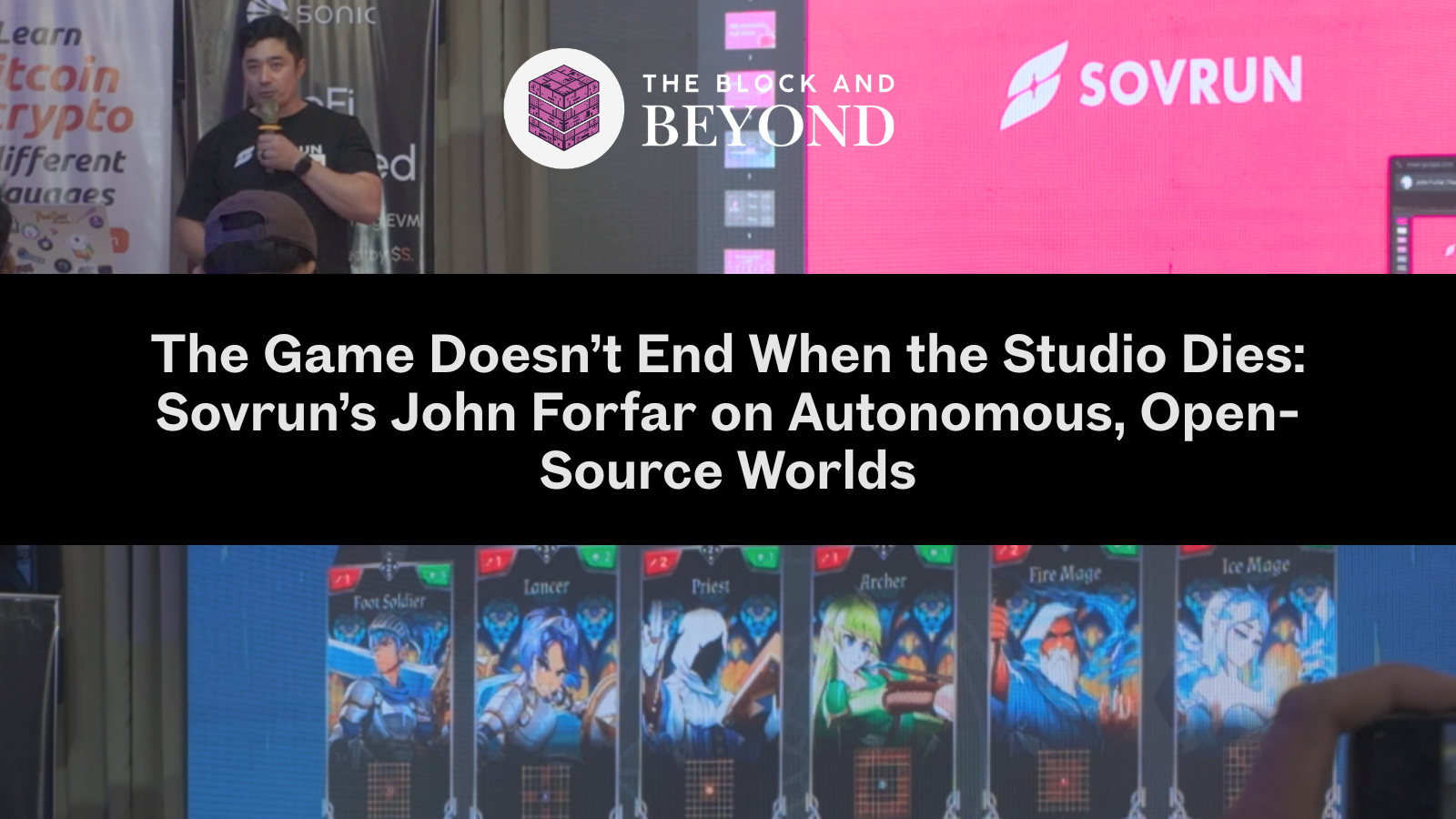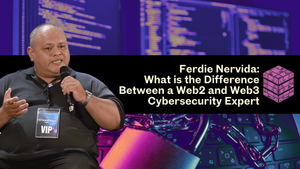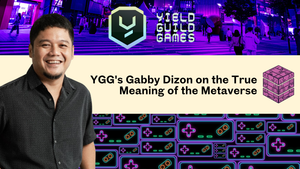Gamers know the pain: you invest hours, even years, into a game only to watch it vanish when the studio shuts down. In Web3, that problem has a name: end-of-service risk, and Sovrun is building the solution.
The real innovation in Web3 gaming isn’t just in the tokens or artwork, it’s in how games are being built to last. Not for launch week. Not for quarterly revenue, but as autonomous systems designed to persist, evolve, and survive without anyone pulling the plug.
In a packed room of developers and aspiring builders at the Sonic Meetup in Davao, co-hosted by Bitskwela and supported by the Davao DeFi Community, John Forfar, Developer Relations lead at Sovrun, didn’t just give a technical demo, he laid out a future where Web3 games don’t rely on studios to survive.
Forfar’s message was clear: games should be autonomous, communities should be empowered, and the Philippines has a chance to become a serious player in the global development space.
“You’ve probably played a game where you’ve put in 10,000 hours, and then the company shuts it down… Everything you earned, bought, and built—gone. That’s what we’re trying to solve.”
Sovrun’s mission, as he explained, is to create on-chain games that keep running regardless of who’s maintaining the servers. These are known as autonomous worlds, decentralized, fully on-chain games where the assets, logic, and gameplay live on the blockchain, not inside a company database.
The implications are massive. If successful, Sovrun’s approach could reshape how players interact with games, how developers build them, and how ownership is defined in digital worlds. But just as important to Forfar is who builds that future, and he’s betting on Filipino talent.
𝗕𝗶𝘁𝘀𝗸𝘄𝗲𝗹𝗮: 𝗦𝗼𝗻𝗶𝗰 𝗖𝗼𝗺𝗺𝘂𝗻𝗶𝘁𝘆 𝗡𝗶𝗴𝗵𝘁 𝗥𝗲𝗰𝗮𝗽
— Sovrun Ecosystem (@Sovrun_Eco) April 8, 2025
We had an amazing time over the weekend in Davao! 🎉 Our team at @SovrunOfficial showcased our new open-source code repositories and guided developers on how to run @ChainTactics, making it easy for them to… pic.twitter.com/0nKxdq0Frm
From Solana to Sovrun: Why Forfar Believes in On-Chain Games
Originally from Australia, John Forfar got into crypto in 2017, but it wasn’t until the 2020 bull run that he became deeply involved in Web3 development. He started blogging about Solana before its mainnet launch, eventually founding the Solana Australia community and working with Superteam to organize developer events across Asia and Oceania.
That experience led him to Sovrun, a rebranded gaming infrastructure startup originally formed during the Axie Infinity boom. With backing from investors like RitaDAO and a core team based in Manila, Sovrun has since evolved from NFT minting to pioneering game development tooling on Ethereum L2s.
“What we’re building now is focused on making games that don’t break when a company disappears... The logic and state are stored on-chain. No one can pull the plug.”
Forfar has made Davao his home base for nearly two years. From there, he works remotely with teams across the Philippines and abroad, managing Sovrun’s growing library of open-source tools and developer documentation. His focus is practical: get more developers hands-on with Web3 frameworks and lower the barrier to building.
“It’s not about hype. It’s about creating real systems that people can fork, use, and own."
Autonomous Worlds and the End-of-Service Problem
Forfar’s presentation centered on the core concept of autonomous worlds, a term gaining traction among developers who want to decouple games from centralized servers. In traditional gaming, if a company shuts down, the game disappears with it. In Sovrun’s vision, the game lives on.
“The biggest problem in gaming is the end-of-service risk... We’re used to studios just pulling the plug. Web3 gives us a way to prevent that.”
Sovrun’s technical stack includes mud.dev, a framework that allows developers to write smart contracts that store both logic and game state directly on-chain. This means that once deployed, the rules and progress of a game are no longer dependent on private infrastructure, but they become public, persistent, and tamper-proof.
He demonstrated this using Chain Tactics, Sovrun’s open-source battle chess-style game. Entirely on-chain, the game supports PvP matchups, character deployment, and action execution, all recorded on the Ethereum L2 backend. Developers can fork the project, modify gameplay rules, and deploy their own autonomous variations.
“It’s not just assets anymore… The entire world—the movement, the player stats, the combat—is on-chain. And anyone can build on top of it.”
With everything running on smart contracts, these games don’t need a company to continue functioning. Communities can maintain, evolve, and expand the experience without relying on the original developers, a true step toward digital sovereignty.
A Call for Builders, Not Just Users
But Forfar wasn’t just there to show code. He issued a challenge to the Philippine tech community: stop being users, start being builders.
“The Philippines has one of the highest crypto adoption rates in the world… But most of the activity is usage, not development.”
He pointed out a striking statistic: while the country has an estimated 200,000 Web2 developers, only around 200 are currently active in Web3. That’s just 0.1%. In comparison, other countries like Vietnam and India are rapidly producing Web3-native devs, and raising capital through hackathons and community-led projects.
“We have the talent. We just need to activate it... With AI, open-source frameworks, and better documentation, there’s never been a better time to start.”
Sovrun is doing its part by releasing Chain Tactics as a free public repo on GitHub, along with developer guides, server setup scripts, and Unity client code. The goal is to make onboarding as seamless as possible, even for students and first-time builders.
The Open-Source Future of Gaming
Beyond the technicals, Forfar believes Sovrun’s open-source approach can spark a cultural shift in how games are made and who gets to make them. By removing permissioned layers, developers anywhere, especially in emerging tech hubs like Davao, can contribute to global Web3 projects.
“You don’t need VC funding or a Silicon Valley office. You just need curiosity, time, and a GitHub account."
He emphasized that contributing to early-stage projects often means not just gaining experience, but also earning ownership. Through tokens, DAOs, and community roles, developers can hold real economic stakes in the projects they help grow.
Forfar’s broader message? Web3 development is not about getting rich quick. It’s about building things that outlive you.
“Games shouldn’t disappear when a company fails. And developers shouldn’t be shut out of the ecosystems they help build... That’s what we’re working toward.”
With Sovrun pushing fully on-chain frameworks and making its infrastructure public, the opportunity is on the table. Forfar’s challenge is simple: will Filipinos keep playing? Or will they start building?











